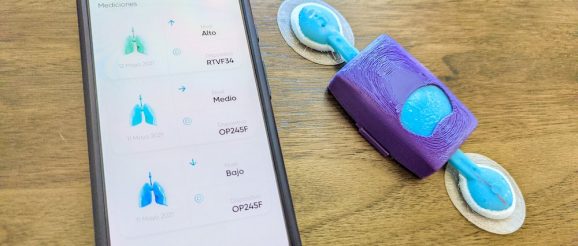Wearable to assess lung function with acoustic levels – Med-Tech Innovation

Respira Labs, a medical technology company specialising in respiratory care, will launch a new wearable which continuously assesses lung function without requiring patients to blow into anything.
Designed initially to assess COPD, COVID-19 and asthma patients, the wearable patch has embedded speakers and microphones which measure changes in acoustic resonance as a proxy for changes in lung air volume, the basis of pulmonary function testing.
The wearable, called Sylvee, is worn by patients on the lower part of the rib cage. It monitors the lung function over time to provide a comprehensive overview of a patient’s condition.
Sylvee ‘injects’ noise into the lung area and then measures the type of sound that is produced. Like a thump on a drum, if there is air trapped in the lung the sound it makes differs from the resonance of sound produced when air is fully expelled from the lungs. Air trapping is a central and early symptom of respiratory decline. The Sylvee app uses DSP (digital signal processing) and AI to analyse the results which pulmonologists and primary care physicians can review, looking specifically at lung volume, capacity, rates of flow and trapped air.
Dr. Maria Artunduaga, Respira Lab’s founder and CEO, said: “Well-established science shows that air trapping can be measured with more than 90% accuracy using low-frequency sound. There is a clear difference in the acoustic resonance spectra of COPD patients versus healthy controls. With more than 100 million Americans affected by COPD, COVID-19 and asthma, and with an aging population, it can be lifesaving to remotely and accurately monitor lung function and discover a problem early enough to avoid serious consequences. Our goal is to flag abnormalities early, enable earlier treatment at home and empower patients to manage their own health.”
Sylvee uses sound to assess lung health rather than to create images. The device uses off-the-shelf sensors similar to the technology in hearing aids. The sensors in the device connect to a smartphone app where proprietary algorithms and machine learning convert active sound signals into acoustic resonance signatures.
Dr. Artunduaga said: “The device facilitates early diagnosis and management of acute deterioration, which is what respiratory patients must avoid. We provide vital information to doctors and patients so they can make the medical treatment changes earlier and prevent hospitalisations.
“This is what happened with my grandmother. She suffered from COPD and had a sudden exacerbation of her symptoms and tragically died. I left my medical career and devoted myself to devise the Sylvee–which is named after my grandmother–because of this terrible and common outcome.”
Speaking to the medical impact of Sylvee, pulmonologist and intensivist at the Pulmonary, Critical Care & Sleep Disorders Institute, Luis Peña-Hernández, M.D. FCCP, said: “Sylvee is a tool that could allow us to intervene early when patients with chronic lung conditions develop air trapping, which is a consequence of bronchial spasm or narrowing. Patients could receive early medical care that could prevent an exacerbation of asthma or COPD. So, besides the obvious economic impact, it could be a game changer improving people’s lives, minimising a disruption in their quality of life, and preventing exacerbations of their chronic lung condition.
“It’s very likely that these early interventions could translate into improved survival. However, we still need data that supports that hypothesis.”
Respira Labs has set a goal of achieving 90% accuracy in measuring air trapping by pursuing a large trial of more than 500 patients located both in the U.S. and internationally. They also intend to publish in top journals by late 2022. The device is currently in prototype with FDA clearance expected within the next 18 months.
